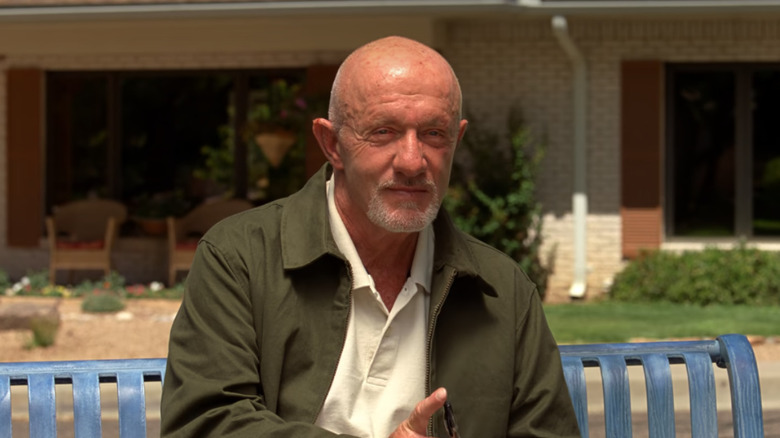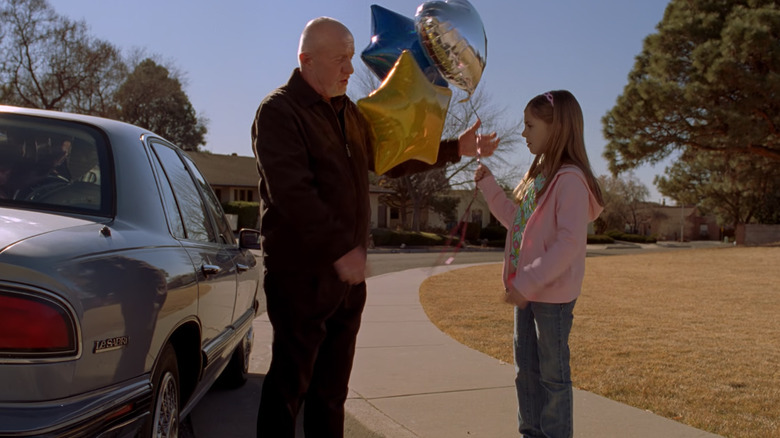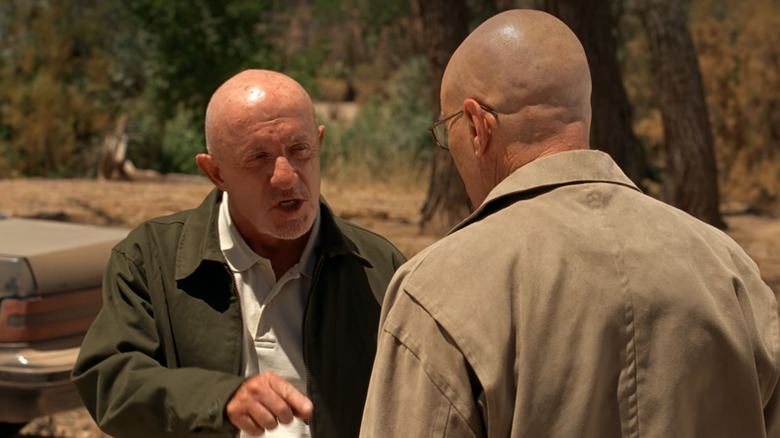Breaking Bad's Jonathan Banks Didn't Agree With Mike's Tragic S5 Decision
Mike Ehrmantraut (Jonathan Banks) is one of those many characters who make "Breaking Bad" such a compelling watch. The similarities of this gruff enforcer to high school teacher-turned-meth kingpin Walter White (Bryan Cranston) are made fairly clear early on. Both are motivated to do awful things for the sake of their family, in Walter's case, he's doing it for his wife and kids, and in Mike's case, his granddaughter Kaylee (Kaija Roze Bales) is his main motivation. It's one of the factors that allows Mike to evolve from a recurring character into a more-or-less leading role over the course of the series. But where Walter loses sight of his reasons over time and lets them get overtaken by his own ego and hunger for power, Mike always seems to keep his family front and center.
It's one of the reasons that Mike's own downfall in the final season is so very tragic. It's not just his death that stings, but the way he is forced to ultimately abandon the very person he has made so many sacrifices for. When Mike gets the call from Walt that the DEA is coming for him, he's at the playground, watching Kaylee. He flees, essentially abandoning his granddaughter. It's a heartbreaking scene, and it turns out that Banks didn't exactly agree with the decision.
"I'd have never left her in the park," he said in a video interview with AMC. "I wouldn't have done it. But you know what? I respect my writers, I respect my producers."
It was necessary for the story
Bryan Cranston, however, had a point, as he clarified in that same interview with Jonathan Banks. If Mike would have stayed to say goodbye to Kaylee and, therefore, gotten arrested, then he would have been unable to access the money that he's been saving up for her, which is the whole reason he got into this dirty game of drug distribution, to begin with. That's also the reason why Mike kills so many people over the course of "Breaking Bad."
"My take on that is that, you get caught, right now, and you can't set her up for what she needs," said Cranston. Banks agreed that story-wise, it was a necessary decision. Not that this stopped him from bickering — in a friendly way of course — with Cranston. "It was the lesser of evils, and that's why I did the damn scene, for Christ's sakes. I didn't go out there and pout. I went out, I did the scene."
Indeed, Mike's decision to flee means that he has a need for his go-bag. Though he asks Saul Goodman (Bob Odenkirk) to retrieve it, Walt does instead, leading to their final face-to-face. When Mike refuses to give Walt the names of his associates in prison to protect his identity, Walt ends up shooting and killing him. Walt then realizes that he could have simply asked Lydia (Laura Fraser) for the names instead.
An unnecessary death
But doesn't this ultimately make Mike's death unnecessary? Had Walt not let his nerves get to him, had he realized from the beginning that he could have gone to Lydia and simply let Mike escape with the go-bag, wouldn't he have been able to keep his identity secret still, and without sacrificing the life of one of his savviest business associates? Probably. And Mike would have been able to better oversee the transfer of the money he has saved to Kaylee. Similarly, there was a sense among fans of the series that Mike made a big mistake by berating Walter for messing up their whole operation.
This isn't to say that Jonathan Banks was upset by Mike's death per se. Banks always knew that Mike had to die, even telling The Wrap that he had expected this fate from the very beginning. But there is a theme of futility that is crucial to the arc of "Breaking Bad." It's emphasized in later episodes when Saul reveals to Walt that all of the money Mike had saved for Kaylee had simply wound up in the hands of the government. If Saul is correct, then Kaylee never saw a penny, and Mike's reason for entering the world of meth distribution was utterly for naught.
Back in their interview, Bryan Cranston continued to insist to Banks that this kind of tragic death was necessary for these kinds of themes to be realized. Banks agreed, at least on principle. That didn't stop a joking Cranston from putting his head back in mock annoyance. "Oh, I'm so glad we're getting rid of you. Oh, my God!" We're starting to see where Banks might have gotten the motivation for Mike's final words to a guilt-ridden Walt.


